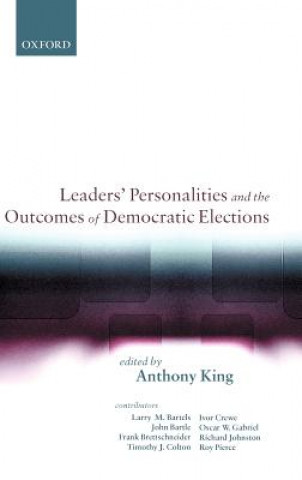
Doručenie
Nákupný poradca





Nehodí sa? Žiadny problém! U nás môžete do 30 dní vrátiť
 Darčekový poukaz
v ľubovoľnej hodnote
Darčekový poukaz
v ľubovoľnej hodnote
S darčekovým poukazom nešliapnete vedľa. Obdarovaný si za darčekový poukaz môže vybrať čokoľvek z našej ponuky.
Leaders' Personalities and the Outcomes of Democratic Elections
 Angličtina
Angličtina
 569 b
569 b
30 dní na vrátenie tovaru
Mohlo by vás tiež zaujímať


The conventional wisdom purveyed by the press and television and accepted as true by most politicians is that elections throughout the democratic world are personal clashes between individual presidential candidates and party leaders. Almost everyone assumes that election outcomes are frequently determined by the major candidates' personal characteristics. In the United States, Al Gore in 2000 came over as aloof and arrogant-and failed to win his expected victory. In Great Britain, Tony Blair in 2001 came across as dynamic and personable-and won a second term. So personal charisma appears to yield electoral success. This study by eminent scholars on both sides of the Atlantic suggests that the conventional wisdom is wrong. Survey research conducted in recent decades indicates that relatively few voters are swayed by candidates' personal characteristics. Far more important are voters' longstanding party loyalties, their views on issues, and their judgments of how well or badly presidents and parties have performed-or will perform-in office. The votes of even the few electors who are swayed by candidates' personalities usually cancel each other out. As a result, election outcomes are seldom decided by individual candidates' personal images. Occasionally, but not often. Ronald Reagan and Bill Clinton owed their election victories more to economics than to charm. At the end of World War II, the charismatic Winston Churchill lost the 1945 British general election; the colorless Clement Attlee won. Chancellor Helmut Kohl remained in power in Germany for a generation-but was never personally popular. Russian voters reckoned that Boris Yeltsin could not hold his drink- but nevertheless elected him. The implications of the authors' analyses are profound. They suggest that modern democratic politics is not nearly as candidate-centered and personality-oriented as is often supposed. They also suggest that parties' policies and their performance in office usually count for far more than the men and women they choose as their leaders. Not least, the authors suggest that the efforts of political consultants, advertising agencies, and spin doctors are often misdirected.
Informácie o knihe
 Angličtina
Angličtina
Kategórie




 Ako nakupovať
Ako nakupovať
























